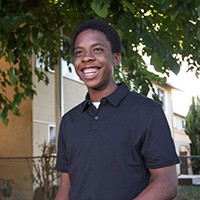Notice of West building lobby closure at Lucile Packard Children’s Hospital Stanford
Lucile Packard Children’s Hospital Stanford is the First Children’s Hospital in North America to Offer Endoscopic Surgery for Swallowing Disorder
Teen from San Jose is now able to eat, sleep and gain weight again
PRESS RELEASE: July 9, 2014
STANFORD, Calif – Deion Brown of San Jose was a typical teenager with a healthy appetite. So, he and his mother knew something was wrong last summer when he could no longer gobble up everything on his plate. Instead, he’d spend time figuring out how he was going to swallow his food, taking small bites, chewing longer than normal and drinking lots of water in between.
“Everything would get stuck right in the middle of my throat,’’ Deion said.

Water helped some, but mostly he ended up regurgitating his food and throwing up often. For the first time in his life, he began losing weight, dropping 2 inches in his waist. Meals with friends became an embarrassment, and he felt tired all the time. Every night before he went to bed, he threw up. That’s because lying down with food lodged in his esophagus was uncomfortable and would keep him from sleeping.
At first doctors thought Deion had allergies, then acid reflux, but after he was treated for both, he still couldn’t swallow properly. Finally, a gastroenterologist diagnosed him with esophageal achalasia, a condition in which tight muscle fibers in the lower esophagus prevent food and liquids from passing through to the stomach. Deion was referred him to James Wall, MD, a pediatric surgeon at Lucile Packard Children's Hospital Stanford and an assistant professor of surgery at the Stanford School of Medicine.
Wall had good news. Not only could he help Deion swallow again, the 16-year-old would be one of the first pediatric patients in the United States to undergo a highly skilled surgery for esophageal achalasia that would require no incisions and result in very little pain, complications or recovery time. Known as POEM – per-oral endoscopic myotomy — the procedure is conducted entirely through a patient’s mouth. Instead of performing laparoscopic surgery, which involves making a handful of small incisions through a patient’s chest or abdomen, Wall works with flexible tools through the mouth to access and divide the tight muscular fibers of the lower esophagus, allowing for the passage of food and liquids.
Deion successfully underwent the POEM procedure in April, becoming Wall’s second patient to receive the treatment. The first was a 17-year-old girl in February in what is believed to be the first POEM procedure at a children’s hospital in North America. Wall has since performed a third, and all had speedy recoveries. In Deion’s case, he needed just one dose of Tylenol for post-surgery pain.
“He went home the next day and was eating like a champ in two weeks,” Wall said.
Wall was assisted in the first pediatric POEM procedure by Homero Rivas, MD, an assistant professor of surgery at the School of Medicine who specializes in digestive and minimally invasive surgeries at Stanford Hospital & Clinics. Rivas introduced the POEM procedure at Stanford in 2012 when only a handful of adult surgeons were offering it in the United States. The minimally invasive procedure was first used in Japan in 2008. Worldwide, over 4,000 patients have undergone POEM procedures, but only 30 of those have been reported on children, all in Europe, Japan and China prior to Wall’s three patients this year.
“POEM is a true innovation and a quantum leap forward,” said William Berquist, MD, gastroenterologist at Lucile Packard Children’s Hospital Stanford and professor of pediatrics at the Stanford School of Medicine. “It’s an increasingly successful procedure that allows for the esophagus to be emptied more effectively, and certainly the least invasive way of fixing problems like Deion’s.” Deion’s mother is now doing everything she can to help her son gain back his lost weight.
“He’s eating everything in sight now,’’ said Tammy Lewis. “Anything I cook, he eats. There is no problem now. It was expert surgery by an expert doctor. It’s a big improvement.”
“There are no scars whatsoever and no chances of infection from incision,’’ Wall said. “As a surgeon, having someone return to see you in follow-up without an incision to check is unusual and gratifying. It’s obvious that POEM is an effective and innovative way to treat cases like Deion’s, and we’re happy to be leading the way in offering it.”
Authors
Media contact:
Winter Johnson
Tel (650) 498-7056
wijohnson@stanfordchildrens.org
About Stanford Medicine Children's Health
Stanford Medicine Children’s Health, with Lucile Packard Children’s Hospital Stanford at its center, is the Bay Area’s largest health care system exclusively dedicated to children and expectant mothers. Our network of care includes more than 65 locations across Northern California and more than 85 locations in the U.S. Western region. Along with Stanford Health Care and the Stanford School of Medicine, we are part of Stanford Medicine, an ecosystem harnessing the potential of biomedicine through collaborative research, education, and clinical care to improve health outcomes around the world. We are a nonprofit organization committed to supporting the community through meaningful outreach programs and services and providing necessary medical care to families, regardless of their ability to pay. Discover more at stanfordchildrens.org.
Connect with us:
Download our App: